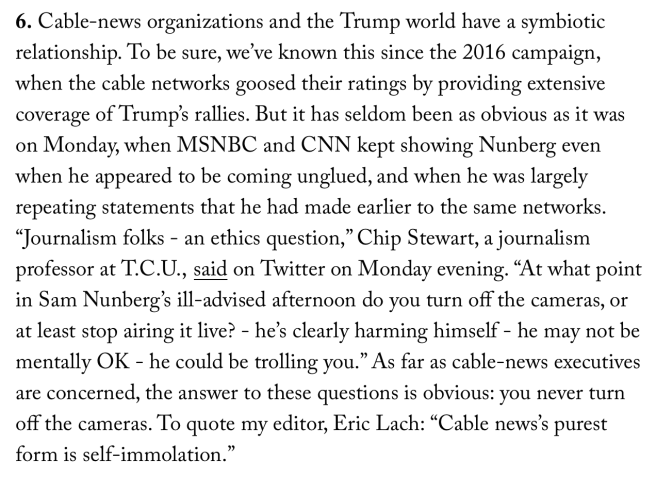I asked this question on Twitter on Monday, in about hour five of the Sam Nunberg meltdown marathon.
Journalism folks – an ethics question. At what point in Sam Nunberg’s ill-advised afternoon do you turn off the cameras, or at least stop airing it live?
– he’s clearly harming himself
– he may not be mentally OK
– he could be trolling you— Chip Stewart (@MediaLawProf) March 5, 2018
I was somewhat surprised by how many folks chimed in on what was largely an honest and useful conversation, something Twitter is not great at facilitating. And the Tweet itself got attention I didn’t expect, when John Cassidy from The New Yorker included it in his column the next day, Six Takeaways From Sam Nunberg’s Big Day Out. An excerpt:

Nunberg, a former Trump aide who appeared to be addled and was certainly making statements against his interest as well as those of his former boss, drew the attention of the political media for hours as he went show to show. The lawyer in me cringed as he threatened not to comply with a subpoena — this is simply something that Is Not Done.
And Nunberg went to law school. He should know better. I also feared he could be spreading misinformation or otherwise was using the platform he was being provided to make a spectacle for the sake of spectacle. He is a Roger Stone devotee, after all.
It turns out this may be closest to the truth, as Nunberg reveled in his moment of fame, declaring “the champ champ does whatever the fuck he wants” to McKay Coppins the next day. Still, it’s a tough question about responsibility on the journalism side. My thought is that (a) absolutely you take the call and you talk to the guy if he wants to talk; but (b) after his first hour of wild nonsense, you stop airing him live, out of responsibility to your audience and to the disturbed source himself. Just because people like the circus doesn’t mean you have to provide it to them. We’re not in the circus business.
One aside, and something I always gripe about — Nunberg repeatedly claimed that one reason he didn’t want to comply with the subpoena was that it would take about 80 hours coming up with all of his communications over a two-year period with 10 people (these included Trump, Stone, Steve Bannon, Michael Cohen, Hope Hicks, and more). I asked my class the next day, “If someone demanded you turn over your emails with another person over a two-year period, how long would it take?”
We know how to use the search function. Maybe 30 minutes? An hour? This is not overly burdensome.
Anyhow, within a few days, Nunberg had turned over the emails in question, saying it wasn’t as hard as he thought it would be. Yeah, we are aware.
An update on the Nunberg will-he, won’t-he drama: He says he’s now compiled all the docs Mueller asked for, tells me, “It ended up not being as onerous as I thought it would be.”
— Jill Colvin (@colvinj) March 8, 2018